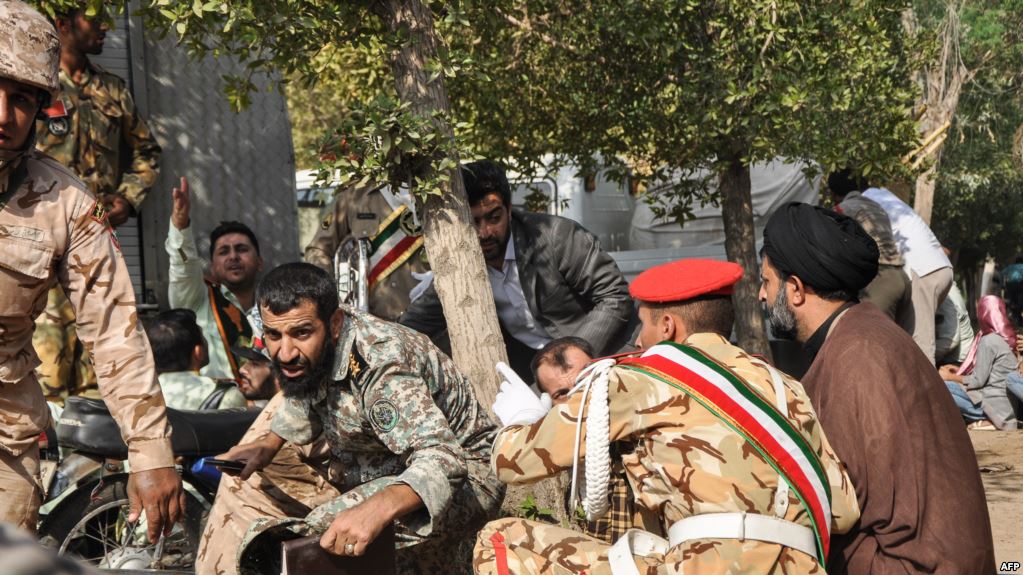Revolutionary Guards claim retaliation for September 22 gun attack in Ahvaz
LATEST
MONDAY FEATURE
How the Assad Regime Continues to Break East Ghouta
Iranian Revolutionary Guards claim they fired missiles into eastern Syria, hitting “terrorists” responsible for a deadly gun attack in Ahvaz in southwest Iran on September 22.
The Guards said in a statement that the surface-to-surface missiles were fired early Monday “in an area east of the Euphrates River”. They claimed that “a large number of Takfiri terrorists and ringleaders” were killed, but did not identify which faction was struck.
#Iran's IRGC, on early Monday morning, fired 6 ballistic missiles at east of Euphrates in #Syria to target the leaders of the terrorist group that conducted #Ahvaz terrorist attack, #IRGC public relations announced. pic.twitter.com/sSm8yYvtCl
— Abas Aslani (@AbasAslani) October 1, 2018
At least 24 people were slain and 68 wounded in Ahvaz when four gunmen attacked a military parade. At least eight Revolutionary Guards were among the dead. Iranian officials initially said two attackers were killed, with confusing accounts about the fate of the other two — Tehran now says that all perished.
Both the Islamic State and a small Ahvazi separatist group claimed responsibility. Iranian leaders, including the Supreme Leader and President Hassan Rouhani, preferred to blame the US, Israel, and Saudi Arabia, asserting that they had supported the assailants.
On Friday, the deputy commander of the Guards, Brig. Gen. Hossein Salami, told worshippers in Tehran that Iran would carry out revenge on those backed by the “nasty triangle” of the US, the “Zionist regime” of Israel, and Saudi Arabia:
If you cross our red lines, we will surely cross yours. You know the storm the Iranian nation can create….We warn the Saudi and Emirati regimes that you cannot endure sustain the blade of our vengeance.
Iran Daily, Sept 29: Tehran to Saudi and UAE — Beware Our Crushing Response
Rebels Rejects Russian Presence in Idlib Zone
Rebels have rejected Russian on-site monitoring of the demilitarized zone in northwest Syria.
The National Liberation Front, a rebel coalition backed by Turkey, had cautiously welcomed the Russian-Turkish deal for a 15 to 20-km wide and 100-km long zone around Idlib and northern Hama Provinces between opposition and Assad regime areas.
But late Sunday, NLF spokesman Naji Mustafa said:
A long meeting was held with our Turkish ally regarding the elements of the agreement, and chiefly the issue of Russia’s presence in the buffer area.
We discussed the issue, and the NLF took a clear position rejecting this matter.
Mustafa said Turkey “pledged that it would not happen”.
Under the agreement, all “radical” factions in the zone must hand over their heavy weapons by October 10 and withdraw by October 15. But, while Russia and Turkey have been clear that the jihadist bloc Hay’at Tahrir al-Sham must leave, the position of other rebel factions has not been defined.
NLF leader Omar Ahmed Hudhayfah said in a statement on Sunday that the Idlib agreement “did not include the evacation of any of our fighters from it”. He said heavy weapons were not an issue, as Turkish forces could “fill the area” to face an Assad regime attack.
“There have been no changes in the location of weapons or redistribution of fighters, even as we remain committed to the agreement reached in Sochi,” said Sayf al-Raad of the Faylaq al-Sham faction.


Iran trying very hard to embarrass itself……epic fail.
https://twitter.com/BabakTaghvaee/status/1046616952708435968
Good thread on twitter showing what happened last night.
https://twitter.com/HeshmatAlavi/status/1046688623171710976